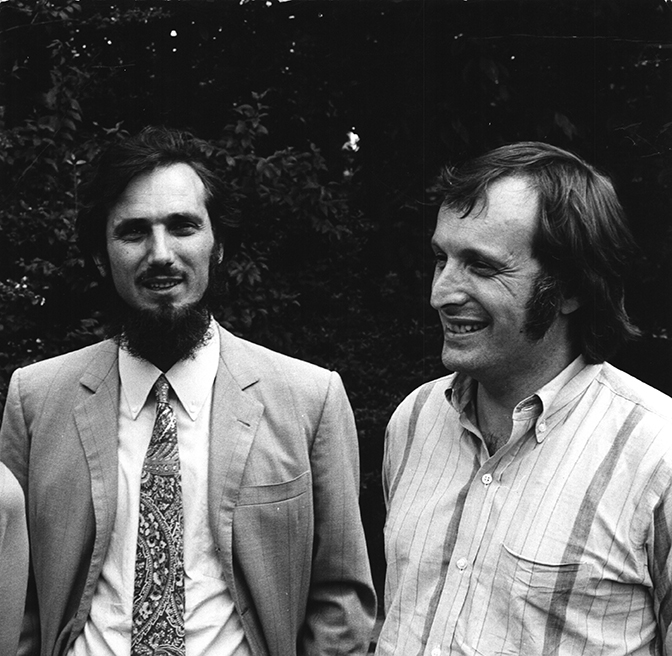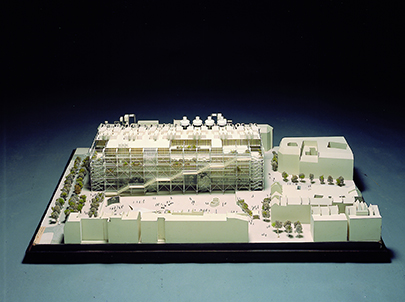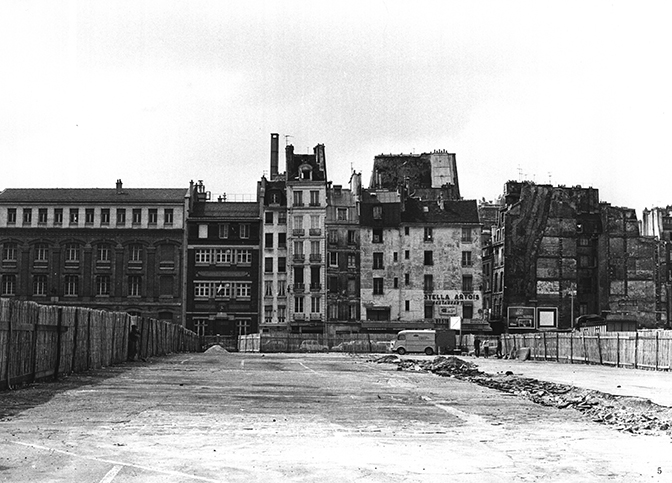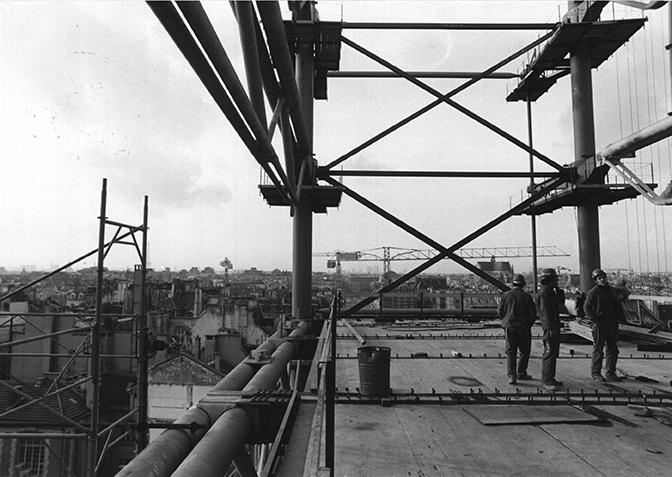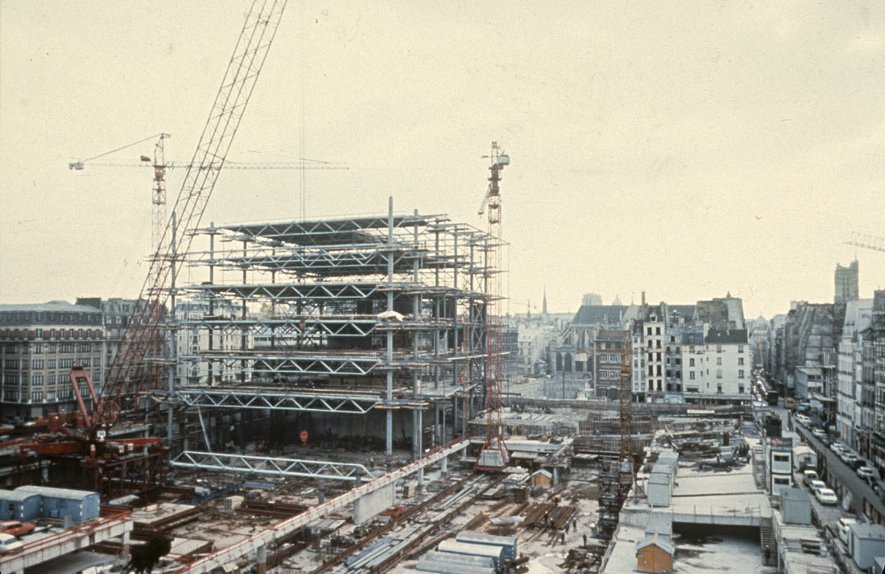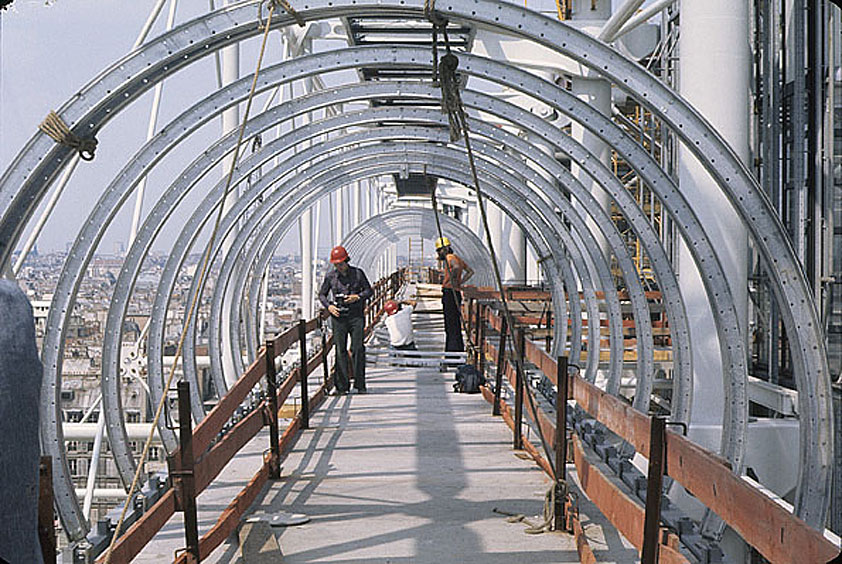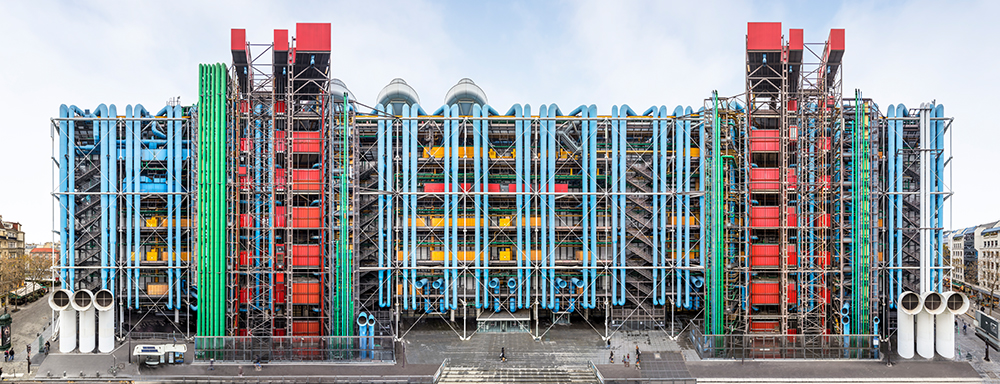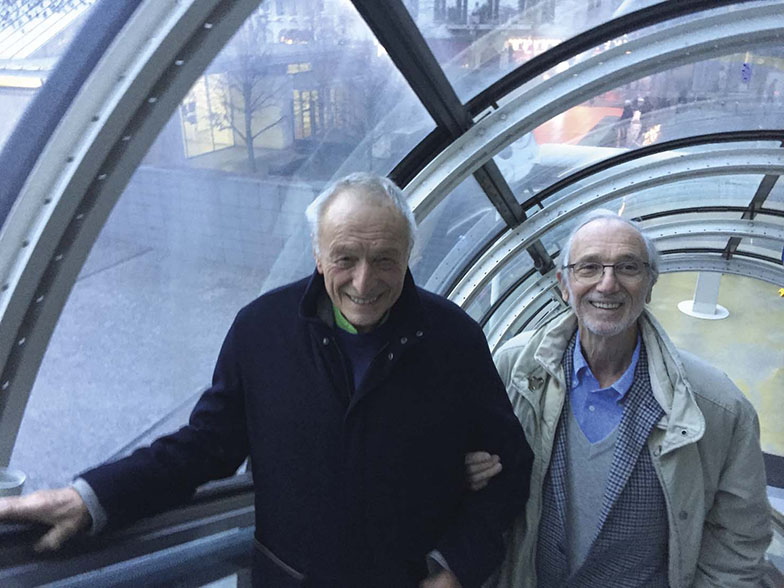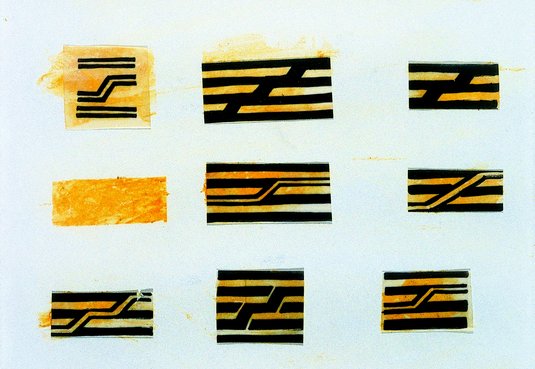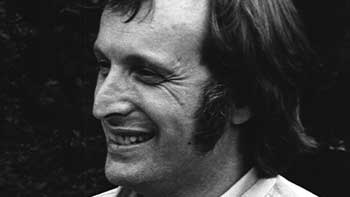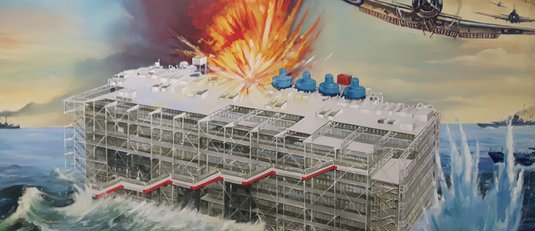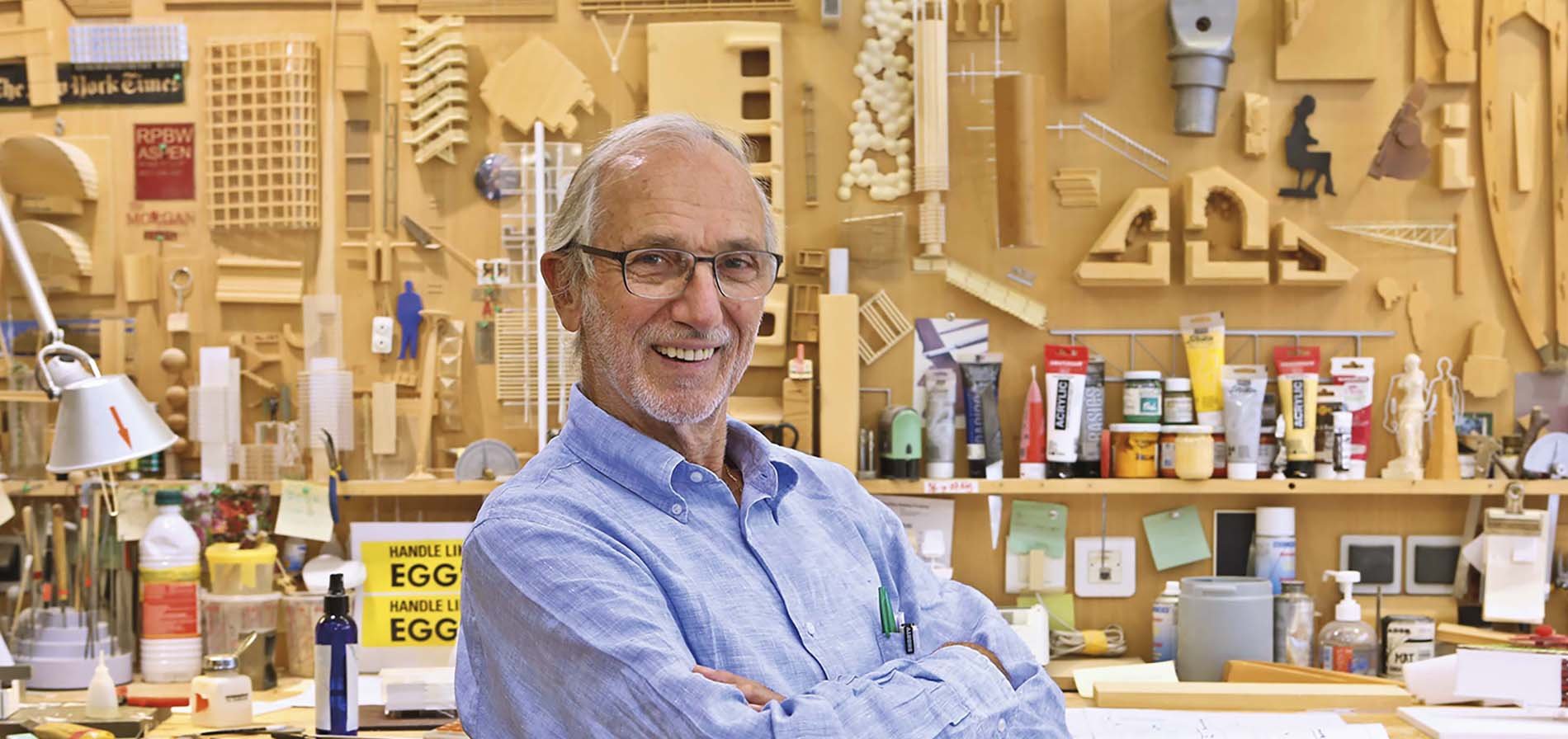
Renzo Piano: "With Richard Rogers, it was an intellectual ping-pong match that lasted fifty years."
Just around the corner from from the Centre Pompidou, in a parallel street, Renzo Piano set up his Parisian agency nearly thirty years ago, called Renzo Piano Building Workshop. Aged 85, the architect still walks from the nearby Place des Vosges where he lives to his office. An opportunity to glimpse from every street corner this "cumbersome child", as he nicknamed it, that is the iconic Centre Pompidou building: "I always say Beaubourg," Renzo Piano jokes in a perfect French with slightly lilting Italian inflections. Even after his latest creations (the Judicial Court of Paris in 2018 and, more recently, the Academy Museum of Motion Pictures in Los Angeles), the indefatigable winner of the 1998 Pritzker prize still works with his teams on many projects. Witty and erudite, he receives us in his firm's hive of activity, recalling his memories of the genesis of the Centre Pompidou, his companionship with his friend Richard Rogers (who passed away in December 2021, editor's note) and the future renovation of his building, scheduled for 2025.
In 1971, when you and Richard Rogers won the international competition, you were young, practically unknown architects…
Renzo Piano — We were just kids! At the time, Richard and I had this really small London firm just off Oxford Street. There were only three or four of us in it and whenever there were clients we called on everyone to make it seem bigger… For the competition, we played around for a month and made lots of drawings. It was a time of protests, May 68 had left its mark and there were new ideas… In London we had the Beatles, mini skirts and long hair, a real whiff of freedom… We designed our project in 1971, just three years after May 68 – the bare minimum to reflect on what had happened. Of course our idea of an "urban machine" was new, but most of all it was derived from the starting brief of what was a State project. This idea of a "centre culturel", like an arts centre, had been floating about in the air for a while, since the early 1960s in fact, and André Malraux. Designing a sort of open, modern cathedral in the middle of Paris was a crazy idea, in the good sense of the term, but most of all it was a courageous idea. Most of all, we managed to seize the time and connect with the zeitgeist.
Jean Prouvé chaired the jury that selected your project, and there were other big names also, like Oscar Niemeyer and Philip Johnson…
Renzo Piano — Jean Prouvé in the jury was a symbol of liberty, he didn't belong to the academic system at all. It was first of all for him that we wanted to compete, but also because it was a competition that was open to everyone, with an unbeatable, incomparable and unpredictable jury. A jury that was composed to come out and say, "go on, then, tell us what to do". It was courageous on the part of a head of State to appoint a jury like that, in search of completely free minds. Of course we didn't know there would be 681 participants in the competition, but we knew it would be enormous. Before taking part, we told ourselves we were sure to lose… and perhaps that's the reason we won! What was interesting was to ask ourselves what we could do if we had a magic wand… Everything was possible. I was 33 at the time and Richard was 37, we were young, we didn't hesitate, we just went for it. We had felt in an empirical way that it was the moment to create a sort of factory, a laboratory, a space liner. At the time, we ourselves didn't go to museums, which were slightly intimidating places.
Before taking part, we told ourselves we were sure to lose… and perhaps that's the reason we won! What was interesting was to ask ourselves what we could do if we had a magic wand… Everything was possible.
Renzo Piano
Our idea was to make a strange kind of ocean liner that was open, transparent, breathing as people moved about like blood in the veins… We wanted to ignite a spark of curiosity. Lots of people screamed in the beginning, some said it was a "culture supermarket", a "factory", a "refinery", but there was nothing intimidating about our creature. Inside was a miracle.
Your complicity with Richard Rogers lasted more than fifty years… What sort of work dynamic did you have?
Renzo Piano — Richard was the "big" guy. He was four years and fifty-seven days older than me. It's not much, but at that age it counts. He was always the one who came first in everything. He was my guide, my big brother. I spent my life running after Richard, in everything. Richard had a sublime elegance and stubbornness. Richard was the condottiero, the captain, and I was more of a handyman. I was a slightly enlightened handyman and he was a thinker and bit of a handyman, too… We spent our life chatting. Even when we had our separate firms, him in London and me in Paris, we'd see each other all the time, we spent our holidays together on my boat.
He was my guide, my big brother. I spent my life running after Richard, in everything. Richard had a sublime elegance and stubbornness. Richard was the condottiero, the captain, and I was more of a handyman.
Renzo Piano
With Richard it was an intellectual ping-pong match that lasted fifty years. Between us we spoke Italian. Richard spoke it fluently because his mother was Italian. When we started working together in 1969, it was really love at first sight as they say. If you ask me the fatal question of who thought of what for Beaubourg, I wouldn't be able to answer! In the beginning, ideas are little nothings, things you banish from your mind. But it's different when you have someone in front of you who bounces it back to you. You couldn't say that one was the intellectual and the other the builder. With Richard, we agreed on the major principles: the city and the role of public buildings, beauty as an ethically powerful and profound dimension of culture, beauty first of all.
Your building has become iconic, a symbol of Parisian modernity…
Renzo Piano — It took ten years, even longer, for our building to become a part of the city. We had the somewhat miraculous idea of designing a "square". And we were the only ones out of 681 architectural projects to propose that. All the other projects took up all the available space. Straightaway, we said we had to have emptiness, a public space. The square is the icon of the city, a place where people meet, where disparities and differences are diminished, where the urban comes to the fore. This idea of a square helped Parisians to understand the building. And you really do need space to land a spaceship!
What are your influences?
Renzo Piano — A delicate question. You know, at my age, I find that I don't really exist on my own – I am the sum of everything I've seen, the people I've met, the journeys I've made, the beauty and the nature I have enjoyed… Jorge Luis Borges wrote beautiful words, something like "every creative gesture comes from somewhere suspended between memory and oblivion". I don't really want to try too hard to understand where things come to me from… I'm always touched by and passionate about light. I was born on the Mediterranean, in Genoa, I have always had light in my eyes, the light of the Mediterranean, a special sea that has vibrations, colour, voices. My father was a modest builder. I grew up on building sites. When I was 6 or 7 years old, he used to take me with him. I would sit on a pile of sand, he would say "don't move, stay there"… And I participated in the miracle of building. After mass on Sundays my father always took me to the harbour. He was a man of the earth, but he loved the harbour. There were liners in Genoa harbour after the war, sort of monsters, beautiful slow-moving monsters… Machines that moved! That's it, all you've seen, the people you loved, the living, the dead, you are the sum of all that.
My father was a modest builder. I grew up on building sites. When I was 6 or 7 years old, he used to take me with him. I would sit on a pile of sand, he would say "don't move, stay there"… And I participated in the miracle of building.
Renzo Piano
I'm very attached to beauty. It's a word I use more easily in Italian, and even more easily in Greek, kalos, although I don't speak Greek. Unfortunately, the word beauty in French or in English often evokes frivolous things. "Bello" in Italian, doesn’t just mean beautiful, but also "good". One day I did a project for Léopold Sedar Senghor and he explained to me that there isn't a single African language in which the idea of beauty is separate from that of good… People have a secret desire for beauty that they're not necessarily conscious of. So, as you go up the levels of the Centre Pompidou for the pleasure of discovering the view of Paris, by chance you may rub against something that is beauty.
What do you think of the future renovation of the building?
Renzo Piano — It's essential to do these works, even if I like Beaubourg with the patina of time… Previously they were works in 2000, now there are others, but the spirit remains the same. I like this idea that every quarter of a century, someone comes along to take care of adapting this tool to culture. I also like having made a building that is capable, every quarter of a century, of questioning itself while still remaining itself.
Beaubourg isn't a building, it's like a bridge, something that will be there for thousands of years… That's what Monsieur Pompidou told us when we met him. We had just won the competition. Richard and I had put on ties, I had a jacket I'd been lent, which was too small, Richard too but no shirt. He was wearing a t-shirt… Monsieur Pompidou spoke nicely to us: "are you aware that this building will live for five hundred years?" Richard and I looked at each other. We had never made something that had lasted more than six months!
Beaubourg isn't a building, it's like a bridge, something that will be there for thousands of years… That's what Monsieur Pompidou told us when we met him. We had just won the competition. Richard and I had put on ties, I had a jacket I'd been lent, which was too small, Richard too but no shirt.
Renzo Piano
Your firm is just next to the Centre Pompidou. You can't get away from it. The building acts as a sort of magnet, doesn't it?
Renzo Piano — I see it every time I go outside. I see it when I walk home. But I am never tired of it! I often joke that I'm a sort of "Quasimodo" of Beaubourg… We love our children, this one is perhaps the most cumbersome! I also love the others. I often travel to see them, to rediscover them. I always ask this question, the one we also ask ourselves about our own children, "are they happy?". I think Beaubourg is happy. ◼
Related articles
Portrait de Renzo Piano, photo © Stefano Goldberg
